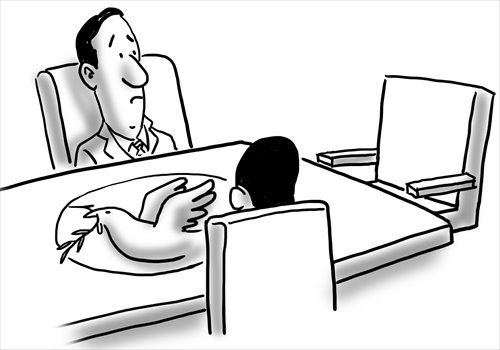Will UN resolution bring N.Korea to table?

Illustration: Liu Rui/GT
Tensions are simmering on the Korean Peninsula and the search for a way out remains a perplexing one.
The 9.19 Joint Statement in 2005, reached under the framework of the Six-Party Talks, prescribed the principle of "action for action" as a guideline for the denuclearization process, based on which Pyongyang would gradually freeze and abandon all of its nuclear programs and international society would respond to North Korea's security concerns. However, the situation has slipped backward 11 years after the statement was signed.
The failure to implement the 9.19 Joint Statement indicates that a lack of strategic trust still exists. The US lacks trust in North Korea, while the North has no faith in the outside world.
The situation is worsening. Given its total of four claimed nuclear detonations, Pyongyang considers itself a country with nuclear capabilities. Therefore it deems the Six-Party Talks that aim at denuclearization of the Korean Peninsula meaningless.
It's a necessary step that the UN unanimously passed the Resolution 2270. Pyongyang's continued defiance of its international obligations and commitments must be warned and punished.
The fact that China, the US and Russia all voted in favor of the new sanction resolution reflects a united stance in opposition to North Korea's nuclear tests. The three countries have consistent interests in opposing nuclear proliferation in Northeast Asia, but they diverge on how to reach this goal.
For example, China and Russia stand firmly against the planned US deployment of the Terminal High Altitude Area Defense missile defense system in South Korea. North Korea's nuclear test should be condemned, and so should the US' attempt to take advantage of the occasion to expand its military presence in the region.
While China shows support for the new sanctions, it also emphasizes that they are just a way to persuade the North back to the negotiation table. Dialogue is the best course to resolve the North Korea conundrum.
China and Russia must enhance coordination while interacting more with North Korea. Moscow, in particular, given its growing ties with Pyongyang, should play a bigger role in getting Pyongyang to realize that its current approach is leading to a dead end.
There are multiple plans of how to resume negotiations under discussion in China.
One suggests a three-step road map: First, Washington and Seoul suspend joint military drills in return for Pyongyang halting nuclear tests; second, should talks over a replacement of the Korean Armistice Agreement with a peace treaty commence, Pyongyang freezes its nuclear programs; and finally, after the normalization of the US-North Korea ties and the opening-up of North Korea, the North totally abandons its nuclear programs.
Many other plans are also being debated in China. The underlying principle is that the problem should be resolved through negotiations.
It's noticeable that the US has its own bottom line over the North Korean nuclear issue. The US currently deems the North Korea nuclear abilities no harmful to its interests.
But once the North crosses the nuclear threshold by arming a warhead, the US will not hesitate to take military actions to sabotage its nuclear capabilities.
There are three possibilities on the peninsula. The first one is what I expect most. That is, the North will soften its attitude and return to talks six months later.
It's estimated that as long as China and Russia take seriously suspending exports of oil, especially aviation fuel, to North Korea, the North will be hard hit in four or six months.
Resolution 2270 is the toughest set of sanctions yet and if it is well implemented, it will inflict unbearable pain on North Korea and force it back to the negotiation table.
The second possibility is that the North will continue its tough gestures. The belligerent gestures of the North may be a show driven by domestic political pressure. In that case, it's a political game, but if it becomes too vehement, a military conflict may be inevitable.
The last one is that the impasse will last five to six years and finally the North crosses the nuclear threshold. It must be brought back to the negotiation table before the worst-case scenario happens.
The author is deputy dean of School of International Studies, Renmin University of China. opinion@globaltimes.com.cn Follow us on Twitter @GTopinion